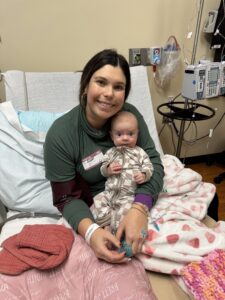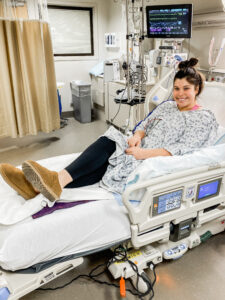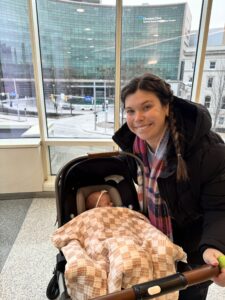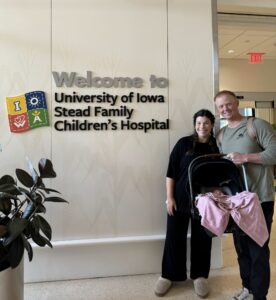Vasculitis and Motherhood: A Story of Hope and Resilience
 Avery Owens’ journey to motherhood is an inspiring testament to the power of perseverance and the importance of seeking expert medical care.
Avery Owens’ journey to motherhood is an inspiring testament to the power of perseverance and the importance of seeking expert medical care.
Avery, 29, was 15 when she first developed symptoms of vasculitis. It took nearly five years to receive a diagnosis with granulomatosis with polyangiitis (GPA). Shortly after receiving her diagnosis, she was told that having children would likely be impossible. Today, her story offers hope and valuable lessons for others facing similar challenges.
Avery’s symptoms began with fatigue, nasal crusting, bloody noses, a saddle nose deformity, and weight loss. Following a septoplasty, a corrective surgical procedure done to straighten a deviated nasal septum, in September 2011, her surgeon, concerned by the severity of her symptoms, referred her to the University of Iowa. Originally from East Moline, Illinois, but now residing in Davenport, Iowa, Avery began a long search for answers.
The odyssey included two visits with her parents to the Mayo Clinic in Rochester, Minnesota, where nasal biopsies were performed, each yielding negative results. Finally, in 2016, she was diagnosed with GPA at St. Louis Children’s Hospital in Missouri.
Living with Vasculitis
 Avery’s initial understanding and awareness of vasculitis came from the television series “House.” However, she quickly learned the realities of living with GPA, including the constant vigilance required to avoid infections due to her compromised immune system. She also faced the challenge of rebuilding her nose after a collapse and the loss of a lung lobe, for which she sought treatment at Cleveland Clinic in Ohio.
Avery’s initial understanding and awareness of vasculitis came from the television series “House.” However, she quickly learned the realities of living with GPA, including the constant vigilance required to avoid infections due to her compromised immune system. She also faced the challenge of rebuilding her nose after a collapse and the loss of a lung lobe, for which she sought treatment at Cleveland Clinic in Ohio.
“I had a chronic infection in my right lower lobe,” Avery explained. “My doctor at Cleveland Clinic couldn’t keep the hole open with balloon dilation, so we decided to have it removed(in May 2018 to prevent further damage/infection to other parts of my lung.”
While acknowledging that a “normal” life isn’t always attainable, Avery’s resilience shines through.
She proactively manages her health and empowers herself with knowledge. Her “lemon” tattoo—inspired by the proverb “When life gives you lemons, make lemonade”—serves as a powerful symbol of her ability to transform challenges into positive outcomes.
“I have tried to live by my mantra, making the most of every opportunity, and not letting my disease stand in the way,” she said.
Pursuing Pregnancy
 Perhaps the most significant challenge, however, was the impact on Avery’s ability to have children. Despite being told it might not be possible due to the severity of her disease, Avery felt incredibly blessed to have her daughter, Brett, born on October 2, 2024.
Perhaps the most significant challenge, however, was the impact on Avery’s ability to have children. Despite being told it might not be possible due to the severity of her disease, Avery felt incredibly blessed to have her daughter, Brett, born on October 2, 2024.
The conversation about having children began years earlier. Her rheumatologist at the University of Iowa was always mindful of treatments that could affect her future fertility.
“Throughout the years, we had always discussed plans of having children with my doctors, who wanted me to be in remission when I planned to become pregnant,” Avery said. “I had to have Cytoxin at some point in college, and this caused concern for long-term damage, but we believed it was the necessary treatment at the time.”
Avery married Drew in September 2021 and experienced a flare-up. In May 2022, she underwent a bronchoscopy at the University of Iowa.
“I woke up to doctors expressing concern that I needed immediate treatment, and some of the first words I heard were warnings against pregnancy,” she said.
Avery was then recommended a treatment plan that insurance wouldn’t cover, including Lupron, a medication that suppresses ovulation. Seeking a second opinion, she returned to Cleveland Clinic. There, Avery consulted with pulmonologist Dr. Michael Machuzak for another bronchoscopy.
 “Dr. Machuzak showed confidence in a less-invasive treatment plan, and we proceeded with that.”
“Dr. Machuzak showed confidence in a less-invasive treatment plan, and we proceeded with that.”
Avery and Drew traveled to Cleveland every six weeks, and as her lungs improved, the appointments became spaced at 12 weeks and then six months apart.
“I’m still currently being seen by Dr. Machuzak, who monitors and treats my lungs as needed.”
Avery maintained a positive mindset throughout her disease and treatments, even during difficult times. She allowed herself 24 hours to grieve unplanned setbacks and then refocused on managing her condition. When she experienced irregular menstrual cycles and consulted with fertility and IVF doctors, it was truly a challenging period for her.
“I had to grieve for what I thought life would be. We had done everything right, so why was this happening?”
Finding the Right Team
 But as Avery progressed with Dr. Machuzak at Cleveland Clinic, she became more optimistic about having a child.
But as Avery progressed with Dr. Machuzak at Cleveland Clinic, she became more optimistic about having a child.
“Between Dr. Machuzak, Dr. Alexandra Villa-Forte, Dr. Cyndee Miranda, and Dr. Michael Khabbaza, I felt confident in their care. They assured me they would help me achieve the healthiest pregnancy possible.”
Despite warnings of potential complications, Avery trusted her medical team. “If they can guide other mothers through this, I can do it one day,” she said.
Avery, a goal-oriented individual, described her pregnancy as surreal. She endured four hours of pushing during delivery.
“I don’t think I could have done it if my lungs weren’t in such good condition. Of course, now that Brett is here, I can’t imagine life without being a mother. It’s truly one of the greatest blessings. I couldn’t have done it without my mom either. She has been a rock in my GPA journey and truly pushed for the best care.”
“Seeking a second opinion at Cleveland Clinic was a pivotal decision, and I’m grateful for the medical team who made my dream of motherhood a reality,” Avery said.
She encourages women with vasculitis to pursue motherhood with the support of knowledgeable and supportive doctors.
Gaining Knowledge Through VPPRN
Avery joined the Vasculitis Pregnancy Registry (VPREG), which helps researchers understand how vasculitis impacts pregnancy and vice versa. VPREG is run through the Vasculitis Patient-Powered Research Network (VPPRN). The goal of the VPPRN’s research program is to conduct high-quality studies that will improve the care and the health of patients with vasculitis by exploring research questions that matter most to patients and advance medical knowledge about vasculitis. Avery has followed VPREG’s pregnancy/fertility studies.
research program is to conduct high-quality studies that will improve the care and the health of patients with vasculitis by exploring research questions that matter most to patients and advance medical knowledge about vasculitis. Avery has followed VPREG’s pregnancy/fertility studies.
“Being a mom is incredibly fulfilling, and I’m enjoying every moment,” she said. “I’m constantly amazed by Brett’s daily and weekly changes. When I brought her home, my dad advised me to savor every moment, and I try to remind myself of that.”
Avery would like to have another child, but she’s currently focused on recovering from this pregnancy and enjoying Brett’s early development.
She emphasizes the importance of advocating for one’s health and hopes to see increased exposure to vasculitis among medical students and doctors. She advises to seek the best care and always advocate for yourself.
“The diagnosis and treatment are not one-size-fits-all,” she said. “Don’t accept mediocre care.”
